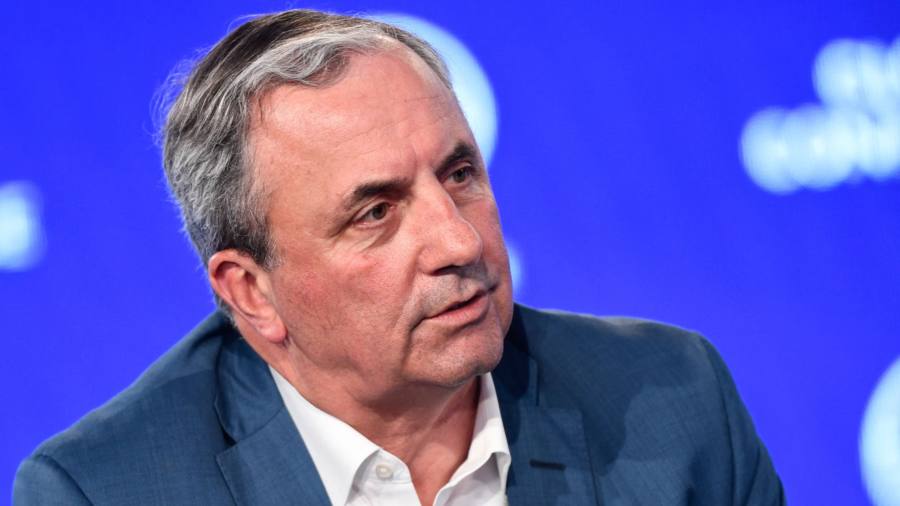[ad_1]
EY’s bosses have approved a plan to split the Big Four firm into separate audit and advisory businesses, with the radical break-up proposal now proceeding to a vote of 13,000 partners.
The decision, which would reshape the accounting industry, follows a summer of delays and internal disagreements over how a split should work as EY aims for a stock market listing of its advisory arm late next year.
Like its Big Four rivals — Deloitte, KPMG and PwC — EY is a network of national member firms in about 150 countries. The leaders of EY’s 15 largest members, which account for about 80 per cent of its $45bn annual revenues, were “unanimous” in wanting to put the split to partner votes, said Carmine Di Sibio, EY’s global chair and chief executive.
Leaders at the 312,000-person firm are betting that both the audit and advisory arms can grow faster as separate businesses unconstrained by conflicts of interest that prevent its consultants from working with audit clients. The split would give clients “more choice”, said Di Sibio.
Under the plan, EY’s audit-focused business with revenues of about $18bn would remain in the existing partnership structure. A separate, larger advisory business would be spun out into a standalone company, with a stake of up to 15 per cent sold to external investors.
EY’s plan assumes aggressive revenue growth in both businesses — up to 7 per cent annually in the audit-led business and 18 per cent in the advisory company, according to people familiar with the matter.
Partners are likely to be pitted against their former colleagues after the split because the audit business will retain some advisory capabilities and its growth will depend partly on bulking up its consulting operations.
EY’s partners, who have been promised big payouts if the break-up happens, will now be asked to vote country-by-country on whether to back the deal between November and January before a final vote of the firm’s global board and ratification by its governance council.
Di Sibio refused to say whether he was confident of winning partners’ backing. “[Our] leaders would not put this forward unless we thought it was the right thing to do,” he said.
EY’s Chinese operations have been excluded from the deal, meaning the country’s consultants will remain tied to the firm’s audit business.
“The one country of the top 15 that we will need to do more work on is China,” said Di Sibio. EY has so far failed to devise a deal structure deemed satisfactory by Chinese regulators.
Both the consultants and auditors of any EY member firm that reject the split will stay as part of the global audit firm.
Parts of the new businesses will be subject to a non-compete clause. “We’re still debating the timeframe — probably three years,” said Di Sibio.
The audit business is set to retain the EY brand while the advisory business would be given a new name. “That hasn’t been totally decided but that’s the presumption,” said Di Sibio.
If it goes ahead, the break-up would trigger multimillion-dollar windfalls for the current crop of partners but doubts remain over how the need to deliver returns to external shareholders in the advisory business would affect the pay and promotion prospects of future generations.
Consulting partners would be handed a 75 per cent share of the advisory business, potentially worth as much as seven to nine times their annual salary, depending on the company’s eventual valuation.
However, the shares would be awarded over five years, effectively tying the financial fortunes of partners to the success of the new venture. Partner earnings in the new company would be cut substantially in the meantime and a cost-cutting programme would be launched.
Audit partners are set to receive cash payouts, modelled at two and four times their annual earnings.
Audit partners had been pressing for a better deal to account for roughly $10bn in unfunded pension liabilities and potential legal payouts from litigation relating to audit scandals at collapsed companies such as Germany’s Wirecard and UK-listed NMC Health.
The auditors’ payouts and the audit business’s debts are intended to be covered largely by a sale of equity to external investors and $17bn of borrowing by the advisory business, said people with knowledge of the plans.
Regulators who need to sign off on the deal are likely to seek reassurance that the downsized audit firm would be capable of withstanding large potential lawsuits in future.
EY Global is being advised by Goldman Sachs and JPMorgan while Rothschild, Lazard and Evercore have been counselling individual member firms on the implications of a split for their partners, according to people with knowledge of the matter. Mercer, the consultancy, has advised on how payouts should be split between partners, according to another person familiar with the matter.
Simpson Thacher & Bartlett and Linklaters are providing legal advice, said people familiar with the matter. Slaughter and May is advising EY UK.
Deloitte, KPMG and PwC have rejected a split of their own but may come under increasing pressure from their own partners to find a strategy that can match the short-term payouts on offer at EY if its break-up goes ahead.
[ad_2]
Image and article originally from www.ft.com. Read the original article here.

